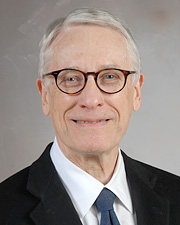About K. Lance Gould, MD
 Dr. Gould was born and raised in rural south Alabama, graduating from McCally Military Academy followed by Oberlin College where he received a Physics Degree and entered Case Western Reserve Medical School. After receiving his M.D. degree he completed Medical residency at the University of Washington in Seattle followed by two years in the Epidemic Intelligence Service based in Hawaii covering the South Pacific focusing on leprosy and measles in island populations. He returned to Seattle to Cardiology training under Dr. Robert Bruce, the developer of the treadmill test, pursued research on coronary artery disease and achieved Associate Professor in 1976.
Dr. Gould was born and raised in rural south Alabama, graduating from McCally Military Academy followed by Oberlin College where he received a Physics Degree and entered Case Western Reserve Medical School. After receiving his M.D. degree he completed Medical residency at the University of Washington in Seattle followed by two years in the Epidemic Intelligence Service based in Hawaii covering the South Pacific focusing on leprosy and measles in island populations. He returned to Seattle to Cardiology training under Dr. Robert Bruce, the developer of the treadmill test, pursued research on coronary artery disease and achieved Associate Professor in 1976.
In 1979 he moved to The University of Texas as Professor and Director of the Division of Cardiology, and founding Director of the Positron Diagnostic and Research Center. After establishing these facilities, Dr. Gould stepped aside from administrative duties in 1987 to focus clinically and scientifically on PET imaging and quantitative coronary arteriography for identifying segmental and diffuse coronary artery disease, measuring its severity and reversing it by vigorous risk factor modification. This effort has evolved into a full time clinical and research commitment to the comprehensive, primarily non-invasive management of coronary artery disease, both prevention and reversal, that safely reduces invasive procedures at reduced cardiac care costs with improved outcomes and lower risk.
Dr. Gould received the International George von Hevesy Prize for Research in 1978, the George E. Brown Memorial Lectureship of the American Heart Association in 1990, numerous teaching awards in both basic science and clinical cardiology, and has been honored nationally by membership in the Association of American Physicians, the American Society of Clinical Investigation and the Board of Trustees of the American College of Cardiology. He is currently Associate Editor of Circulation and on the Editorial Boards of the major cardiovascular journals. He was past Chairman of the Council on Circulation of the American Heart Association, past President of the Houston Cardiology Society. Dr. Gould has published the first and only textbook on quantifying coronary artery narrowing, coronary blood flow and cardiac PET imaging, entitled Coronary Artery Stenosis And Reversing Atherosclerosis, 2nd edition, Arnold Publishing, London, 1998. He has also published Heal Your Heart, How to Prevent or Reverse Heart Disease, the first popular book to distill an extensive scientific literature into simple graphics and text for general non-medical readers. Dr. Gould has received 26 years of continuous competitive research grant funding from the National Institutes of Health, the American Heart Association and/or the Veterans Administration Career Development program. He currently holds the Martin Bucksbaum Distinguished University Chair (the only one in Cardiology in The University of Texas System) and is Professor and Executive Director of the endowed Weatherhead P.E.T. Center for Preventing and Reversing Atherosclerosis.
Dr. Gould’s Clinical Practice
K. Lance Gould, M.D. is a professor of Medicine at McGovern Medical School at The University of Texas Health Science Center at Houston (UTHealth) and his duties include research, teaching, daily performance of PET scans as well as his large clinical outpatient practice. In order to stick to his basic philosophy of giving each patient the individual attention and time needed to reinforce lifestyle change, he has limited his practice to only those patients with Coronary artery disease who are interested in prevention or reversal of disease by lifestyle management.
For this reason, he wrote Heal Your Heart a comprehensive guide, designed for the general reader which details how to work with your personal physician to accomplish a Reversal and Prevention Plan.
Patients with general cardiology problems such as Mitral valve prolapse, other valve disorders, congestive heart failure, or peripheral vascular disease may be referred to other faculty cardiologists at McGovern Medical School at The University of Texas Health Science Center at Houston (UTHealth).